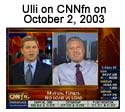|
Straightforward Answers to Your Questions
(Click on your
question to link to its answer)
Are You a Brokerage firm?
What Is Your Mutual Fund Management Plan?
What Is A Market Trend Tracking System?
What Are The Advantages Of Market Tracking Over a "Buy
And Hold" Approach?
What Types of Funds Do You Use?
Just What Is A Mutual Fund?
What Is The Difference Between "Load" And "No-Load" Funds?
Can I Follow Mutual Fund Prices?
What Are The Advantages Of The Mutual Fund Management Plan?
What Are The Disadvantages Of Such A Plan?
What Are The Risks Involved With Mutual Funds?
What Are The Chances Of A Big Loss?
What If I Need My Money?
What If I Want A Monthly Income From My Investment?
What Information Will I Need For Income Taxes?
Is This A Suitable Investment For A Retirement Plan?
What is Your Minimum Account?
How Are You Different From Other Market Tracking Firms And
Why Should I Deal With You?
Why Would I Need Help Managing My Investments?
Should I Wait Until The Stock Market Improves Before Starting
To Invest?
If I Decide To Invest With Your Firm, How Should I Proceed?
-----------------------------------
Are You A Brokerage
Firm?
No, we are an investment management company (registered investment
advisor). Southland Investments never has possession of your money, which
is kept in a discount brokerage account in your name. Currently
we are using Charles Schwab and Co. From this special account we direct
the purchase and sale into various mutual fund families according to the
Management Plan. 
What Is Your Mutual
Fund Management Plan?
Our program combines investment in no-load (i.e., no commission)
growth and money market mutual funds with a market trend tracking system.

What Is A Market
Trend Tracking System?
It is a methodical system that utilizes various indicators
to identify trends in mutual fund prices. Essentially, it tells us when
to buy and sell mutual funds and eliminates mistakes often made in emotional
trading.
There are two objectives to our program:
1) To maximize
potential gain by investing in mutual funds when prices are rising.
2) To preserve
principal and earn interest by shifting client accounts to safe
money market funds when mutual fund prices are falling. 
What Are The Advantages
Of Market Tracking Over a "Buy And Hold" Approach?
Most Investors buy and hold investments. That is, they buy
stocks or mutual funds and hold them through rising and falling markets.
They have no specific plan and are just hoping the funds will have risen
when they need their money.
Even with mutual funds, most mutual fund managers also stay
fully invested in stocks through these rising and falling markets. The
result is that during rising markets investors make money, and during
falling markets they lose their gain.
The key to more successful investing is to be invested in
rising markets and out of them in falling markets. Tracking and heeding
market trends can prevent major losses. 
What Types of Funds
Do You Use?
There are two types of funds in our Fund Management Plan-a
money market fund and various equity growth mutual funds. 
Money Market Fund-We generally use a government money
market fund. This consists of only short term government securities and
is traditionally considered more secure than most other investments. The
price of security is, of course, lower returns. 
Equity Growth Mutual Funds -We invest in whichever
growth fund offers the best combination of potential increase and low
downside risk. The specific funds we choose vary as conditions change
in the stock market and the economy. 
Just What Is A Mutual
Fund?
It is an investment company that pools money from investors
to purchase and manage a diversified portfolio of stocks. Instead
of buying individual stocks, investors buy shares in this managed portfolio.

What Is The Difference
Between "Load" And "No-Load" Funds?
- The term "load"
refers to the initial sales charge when purchasing mutual funds. A no-load
fund has no sales charge deducted when an investor makes a purchase.
- Commissions ("loads")
typically range from 4 to 8.5% of the amount invested, the percentage
decreasing with larger investments. Most accounts would fall in the
6% range. Using 6% as an example, this means that out of each $10,000
invested, $600 is immediately deducted as a sales charge, and only $9,400
goes to work for the investor.
- With a $10,000
investment in a no load fund, the entire $10,000 goes to work for the
investor.
- Whether a load
or no-load fund, the mutual fund management company is paid a 1% annual
advisory fee.
- The performance
of a fund is not affected by whether it is a load or no-load fund.

Can I Follow Mutual
Fund Prices?
Sure. Prices are published every day in the financial section
of major newspapers on the mutual funds page, or are available via the
internet. 
What
Are The Advantages Of The Mutual Fund Management Plan?
1) Mutual Fund Management
has less downside risk than buying individual securities.
2) The Investor
has peace of mind and does not need to make emotional buy or sell decisions.
3) It is possible
to make money in rising and falling stock markets. In declining
markets we are earning interest in our money market accounts, while
waiting for a new uptrend to develop.
4) There is a history
of reliable buy/sell signals. Rallies lasting weeks or months can produce
nice gains with proper trend tracking. The losses on the unprofitable
exchanges have been manageable.
5) Only No-Load
funds are being used resulting in low transaction costs and maximum
principal working for you. 
What Are The Disadvantages
Of Such A Plan?
There is only one situation in which the Mutual Fund Management
Plan won't work effectively, and even then the repercussions are not particularly
costly. It is when the Stock Market, due to economic conditions, fails
to trend either upward or downward, and stays in a sideways pattern resulting
in only minor fluctuations. This is a perfectly normal occurrence within
the business cycle, however, it may give a false signal indicating an
uptrend, only to be followed by a sell signal. Such was the case throughout
most of 1997, and we just held steady. The next major uptrend started
in November, 1998 rewarding us for our patience during the previous year.

What Are The Risks
Involved With Mutual Funds?
A mutual fund reduces the risk of large price fluctuations
through careful selection of securities, and by maintaining a diversified
portfolio. There is much less risk in owning shares in 50 different companies
than in owning stock in one or two companies. In spite of diversification,
however, share prices will decline in a falling market. This is why proper
trend tracking of mutual fund purchases and sales is important. 
What Are The Chances
Of A Big Loss?
They are very small because we take a series of precautions
to avoid losses.
1) Your money is
always invested in a diversified portfolio of securities under full-time
supervision.
2) There is a second
level of supervision since we monitor mutual fund performance daily.
3) Exchanges between
funds are done electronically and verified. This guarantees that we
buy or sell at that day's price and avoids possible losses using written
exchanges, which involve considerable delay.
4) Your money is
always liquid. You have access to your account at all times with the
check writing privilege so you have complete control of it. 
What If I Need My
Money?
You have immediate access to your money at all times. All
accounts except IRA plans have check writing privileges that enable clients
to write checks of $500 or more against their money market accounts. Very
few managed investment accounts allow such direct access to your money.

What If I Want A
Monthly Income From My Investment?
No problem. We regularly work with individuals who need monthly
income. Once you establish the monthly amount to be withdrawn, a check
for that amount can be sent to you automatically. Even with regular withdrawals,
this plan allows you to grow your investment while receiving monthly income.

What Information
Will I Need For Income Taxes?
You will need dividend and capital gain information which
will be sent to you directly by Charles Schwab & Co. Capital gains
and losses on the exchanges between the funds need to be calculated. We
suggest you keep copies of all confirmations from Charles Schwab for this
purpose. However, we also provide cost basis calculations to all clients
free of charge. These will greatly assist your tax preparer in completing
your return. 
Is This A Suitable
Investment For A Retirement Plan?
Yes, it's ideal for retirement plans, including 401k's, since
it provides liquidity, diversification, low risk, professional management
and your gains are tax deferred. 
What is Your Minimum
Account?
Our minimum size account is only $10,000 for individuals,
IRA or Sep-IRA
customers. Because of the historical performance and the liquidity it
is
recommended that you apply all of your available funds, in order to
maximize your returns.
How Are You Different
From Other Market Tracking Firms And Why Should I Deal With You?
- Most
market tracking services require minimum accounts of $250,000 and up.
While we gladly accept larger accounts, we specialize in working with
the investors of more modest means, and our goal is to create financial
independence for them.
- Most
trend tracking organizations work primarily for brokers who sell load
funds with a 6% initial commission in addition to their management fee.
The commission results in less money working for you (because it's deducted
right off the top before it's invested) and this makes it more difficult
to show a profit in the first year. By using no-load funds, 100% of
your money is invested which should increase your net return.
- Most
firms offer mutual funds with penalties if you terminate your account.
We have no penalties.
- Plus we give clients
a pro-rata refund of fees if they terminate their account for any reason.
-
We follow equity growth funds on a daily basis, which ensures that we
stay invested in only the best performing funds.
- Because
we deal in no load funds, there is no conflict of interest to recommend
a fund because of a potential commission. We only recommend funds based
on their performance.
- We
use the same plan for investing our own funds, so we have a vested interest
in obtaining the highest, yet safest, returns possible.

Why Would I Need
Help Managing My Investments?
Maybe you don't. However, if you are trying to determine whether
you should manage your own investments or use our services, here are a
few questions you might want to ask yourself:
1) Do I really have
the time and interest to follow the market closely on a daily basis?
2) Have I done well
in the past managing my own investments?
3) Do I really want
to add another layer of work and responsibility onto an already busy
schedule? 
Should I Wait Until
The Stock Market Improves Before Starting To Invest?
Emphatically, no. There are two reasons why you should not
wait.
1) By the time you
are sure we are in a period of rising stock prices, much of the gain
may already have taken place. The purpose of our method is to invest
your money at the optimum time. If the concept of trend tracking makes
sense in your situation, then the time to set up an account is always
"now."
2) It may take one
to two weeks to set up a new account, have the check clear the bank,
or transfer assets from another firm. Therefore, we strongly encourage
investors to set up accounts when the markets are quiet so that their
money will be in a position to be moved quickly when the price of stock
funds starts to rise. 
If I Decide To Invest
With Your Firm, How Should I Proceed?
Simply call us at (714) 841-5804 or email us at ulli@southlandinvestment.com
and we will schedule an appointment to meet with you if possible, to ascertain
that our investment goals and philosophies are compatible. Don't hesitate
to call if you have questions but haven't decided whether to start an
account. There is no obligation involved with this initial discussion.

|










